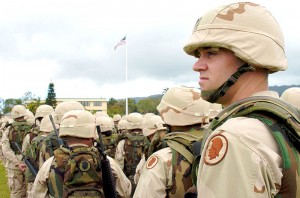Traumatic brain injury (TBI) has become so common in modern warfare that it is sometimes called the “signature wound” in the War on Terror. But even in a culture where awareness is high, TBI may go undiagnosed or untreated.
(TBI) has become so common in modern warfare that it is sometimes called the “signature wound” in the War on Terror. But even in a culture where awareness is high, TBI may go undiagnosed or untreated.
The prevalence of explosive weaponry in countries like Iraq and Afghanistan has caused an epidemic of TBI. And those who have suffered more than one such injury are prone to combat fatigue, stress and posttraumatic stress disorder (PTSD).
Direct contact with the head is not required for TBI to occur. Often, just the shock waves created by explosive devices can injure the brain. And with each successive concussion, the outcome can be more severe and have longer lasting consequences. Not only are these soldiers at risk for permanent brain injuries, but they are also more likely to develop violent emotional dysfunctions, putting their wives, children and others at risk.
A recent National Public Radio (NPR) and ProPublica investigation found that the military medical system continues to misdiagnose or fail to diagnose TBI. In many cases, soldiers receive little or no medical treatment for their injuries. The official military numbers indicate mild TBI injuries in about 115,000 in troops serving in Iraq and Afghanistan, since the beginning of these conflicts. Estimated tens of thousands additional TBI injuries have gone uncounted.
Screening systems in the military fail to recognize nearly half of all concussions. And even when TBI is diagnosed, medical records are lost or technical failures occur when transmitting information from the battlefield. Some soldiers report receiving mental health care instead of the appropriate therapeutic treatments needed to retrain the brain. Some are unable to receive treatment because of missing medical records and some are branded malingerer if they try to receive treatment rather than return to active duty.
As the law stands, soldiers cannot sue the military for malpractice connected to active duty injuries. Some cases have successfully sued when the malpractices stemmed from other non-duty related activities. Such suits were barred by the Feres Decision, a 1950 Supreme Court ruling that denied military personnel the rights civilians have when doctors fail to provide appropriate treatment.
However, a bill is currently in the house to change that. The Carmelo Rodriguez Military Medical Accountability Act (H.R. 1478/ S. 1347), sponsored by Rep. Maurice D. Hinchey (D-NY) and Sen. Charles Schumer (D-NY), was named for a misdiagnosed cancer in a US Marine that led to his death. The bill has passed the house judiciary committee and must still face the Senate for approval. If passed, this bill may be the impetus to force the military to fix the deficiencies in treating TBI. The military has been under pressure to improve TBI diagnosis and treatment for many years, yet has made little improvement.
If you suffer from a serious brain injury and need help seeking the benefits and compensation you are owed, please contact our office for a free consultation. We will help you learn your rights and find assist you in being fairly compensated for your injury.


